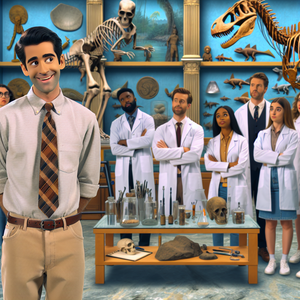
Ross Geller vs. Real Paleontologists: Discovering the True World of Ancient Life
Ross Geller from the beloved TV show "Friends" has entertained viewers with his quirky love for dinosaurs and amusing antics, offering a comedic take on a paleontologist's life. While Ross proudly holds a Ph.D. from Columbia University, his character focuses more on humorous scenarios than the serious scientific work typical of real paleontologists. This contrast raises an intriguing question: What does it actually mean to be a paleontologist today? While Ross provides a fun look at fossils and ancient life, actual paleontologists engage in thorough research and exciting findings that go beyond sitcom humor. Let's explore the varied careers in paleontology, comparing Ross's fictional adventures with the genuine challenges and opportunities faced by specialists in the field.
Job Summaries:
Paleontologist:
- Real paleontologists are committed scientists who uncover Earth's history through detailed fossil studies.
- Unlike Ross, who often sidelines his fossil interest for comedic plotlines, true paleontologists dedicate many hours to analyzing data, conducting fieldwork, and publishing research to enhance our understanding of evolution and environmental changes.
- A Ph.D. is usually required, along with a serious dedication to scientific inquiry that Ross's character only humorously touches upon.
Museum Curator:
- Paleontology museum curators are crucial in managing fossil collections and creating exhibits that engage and educate the public.
- While Ross humorously interacts with museum settings, real curators focus on preserving and interpreting fossil data with care and enthusiasm.
- A master's degree in museum studies is usually necessary for those aiming to make science accessible and engaging for all ages.
Field Paleontologist:
- Field paleontologists are the adventurous explorers in paleontology.
- They plan and carry out excavations in tough terrains, needing expertise in geology and excavation techniques.
- Unlike Ross's occasional enthusiasm, these professionals are deeply committed to discovering and analyzing ancient life.
- A bachelor's or master's degree is crucial for those ready to face the elements in pursuit of important discoveries.
Paleontology Research Scientist:
- These scientists develop theories about species evolution and extinction, requiring not only a doctoral degree but also strong analytical skills.
- They make significant contributions to the scientific community through published research and conferences, a far cry from Ross's lighter approach to paleontological research.
Paleontological Illustrator:
- Illustrators act as the creative link between science and the public, producing accurate visual representations of ancient life.
- This role needs not only artistic talent but also a solid grasp of anatomy, usually supported by a degree in fine arts.
- Although not shown in "Friends," their work is essential in making paleontological findings both interesting and understandable.
Paleontology Educator:
- Educators inspire and teach future scientists about Earth's history and life's development.
- Typically, a master's or doctoral degree is needed, along with a structured teaching approach—something Ross attempts with enthusiasm but often lacks in academic rigor.
Paleontological Consultant:
- Consultants apply their expertise to environmental assessments, ensuring fossil site preservation during development projects.
- Unlike Ross's whimsical adventures, these professionals focus on the crucial task of fossil conservation, requiring a strong background in geology and paleontology.
Paleontology Lab Technician:
- Technicians are the vital support in research facilities, assisting scientists by preparing samples and maintaining equipment.
- Although not highlighted in "Friends," their role is essential for the smooth operation of any research project, needing a bachelor's degree in related sciences.
Vertebrate Paleontologist:
- Specializing in vertebrate fossils, these scientists investigate the evolution of animals, concentrating on bones and teeth.
- A Ph.D. is typically required, offering deep insights into species development that go beyond Ross's dinosaur fascination.
Invertebrate Paleontologist:
- Focusing on fossils of organisms without backbones
- These scientists explore evolutionary diversity
- Their work enhances our understanding of ancient ecosystems
- Often requiring a doctoral degree to study the depths of prehistory
Paleobotanist:
- Paleobotanists study fossilized plants to learn about historical climates and ecosystems.
- Working with climatologists, they contribute to climate models.
- A Ph.D. is often necessary to investigate this important area of research.
Paleoecologist:
- Paleoecologists examine past organism-environment interactions.
- They reconstruct ecosystems to model environmental changes.
- Their work requires a doctoral degree.
- They provide valuable insights into past and future ecological shifts.
- This area is not quite delved into by Ross's character.
By looking at these roles, we not only appreciate the scientific dedication and rigor in real-world paleontology but also highlight the varied opportunities available in this fascinating field. This exploration emphasizes the importance of scientific knowledge and research in understanding our planet's history, offering a look into the captivating world beyond Ross Geller's comedic portrayal.
Explore More Jobs

